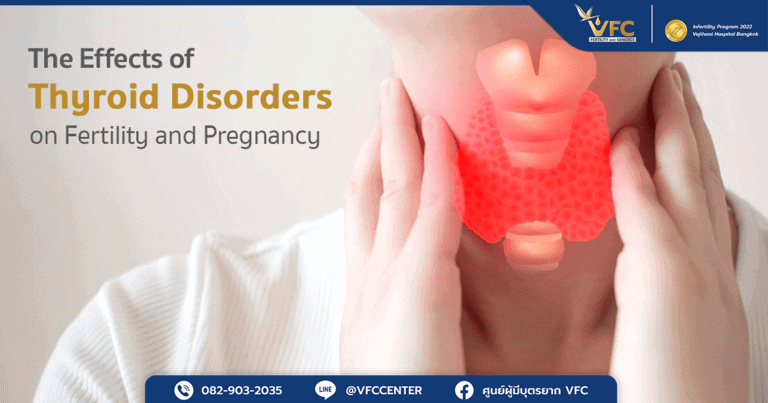
The thyroid gland plays an important function in the body by regulating hormones that control metabolism, growth, and reproduction. It’s a butterfly-shaped gland located in the lower front of the neck. It produces thyroid hormones, including triiodothyronine (T3), thyroxine (T4), and thyroid-stimulating hormone (TSH), which enter the bloodstream and are distributed throughout the body. These hormones affect ovulation, menstrual cycles, and overall fertility.
When thyroid function is disrupted, it can lead to hormonal imbalances that negatively affect reproductive health. V Fertility Clinic offers thyroid screening and PGT-M testing in Bangkok to help identify fertility and pregnancy issues and treatment options.
Thyroid Disorders: Symptoms and Their Impact on Fertility
Thyroid disorders can significantly affect a woman’s ability to conceive and maintain a healthy pregnancy. The most common thyroid diseases affecting fertility include:
Hypothyroidism
Hypothyroidism is when the thyroid gland does not produce enough thyroid hormones. Symptoms include fatigue, weight gain, hair loss, and irregular menstrual cycles. Untreated hypothyroidism can lead to miscarriage, infertility, and complications during pregnancy.
Hyperthyroidism
In hyperthyroidism, the thyroid gland produces excessive amounts of thyroid hormones. Symptoms of this condition include rapid heartbeat, anxiety, and weight loss. Hyperthyroidism can cause preterm birth, preeclampsia, and low birth weight.
Subclinical Thyroid Disorders
Subclinical thyroid diseases are often referred to as borderline thyroid disease. It refers to mild thyroid dysfunctions where there are mild imbalances in TSH, T3, and T4 levels, which show minimal symptoms but can interfere with ovulation and embryo implantation and cause other fertility issues.
Untreated thyroid diseases during pregnancy may cause complications such as miscarriage, preterm birth, preeclampsia, low birth weight, and developmental delays in infants.
6 Ways Thyroid Disorders Affect Fertility
1. Ovulation Dysfunction
Low thyroid hormone levels (hypothyroidism) can interfere with ovulation, making it difficult for the ovaries to release an egg. Its opposite condition, hyperthyroidism, can also disrupt ovulation, which leads to irregular menstrual cycles and difficulty conceiving.
2. Menstrual Irregularities
Thyroid disorders can cause period irregularities, such as lighter or heavier bleeding and shorter or longer cycles. It can even cause amenorrhea, or the absence of menstruation. These irregularities can make it harder to determine the fertile window and predict when ovulation is likely to occur.
3. Hormonal Imbalances
Thyroid disorders can disrupt the balance of other hormones, such as prolactin, which can interfere with ovulation and implantation when present at higher levels.
4. Risk of Miscarriage
Thyroid disorders, particularly hyperthyroidism, can increase the risk of miscarriage, especially in early pregnancy.
5. Impact on Pregnancy
Uncontrolled thyroid levels during pregnancy can lead to various complications, such as preeclampsia, preterm labor, and developmental problems in the fetus.
6. Male Fertility
Hypothyroidism in men can reduce sperm count and quality, impacting their ability to fertilize an egg. It can also lead to erectile dysfunction and decreased libido.
Importance of Screening for Thyroid Function
Screening for thyroid function is crucial for women experiencing infertility, irregular menstrual cycles, or previous pregnancy loss. Blood tests will be performed to measure TSH, free T4, free T3, and thyroid antibodies to gain insights into thyroid health. This is important since early detection and management of thyroid issues can improve pregnancy outcomes and support a healthy pregnancy.
Managing Thyroid Disorders

Effective management of thyroid disorders through various treatments can significantly improve fertility. Some common treatment options include:
- Levothyroxine: This medicine is used for hypothyroidism to help regulate thyroid hormone levels, improve menstrual regularity, and support ovulation.
- Anti-thyroid medication: These medications control hyperthyroidism or excessive hormone production to reduce the risk of pregnancy complications.
- Nutritional support: To support optimal thyroid function, eat a diet rich in iodine, selenium, zinc, and iron, such as seafood, eggs, nuts, and whole grains.
- Regular monitoring: Monitor thyroid levels regularly during fertility treatment and pregnancy to ensure that hormone levels are within the normal range.
Thyroid Function and Assisted Reproductive Technologies
The thyroid plays an important role in the success of fertility treatments like IVF and ICSI. Thyroid imbalances can impact egg quality, embryo implantation, and pregnancy maintenance. At V Fertility Clinic, comprehensive fertility assessments include thyroid function testing to identify and address imbalances before starting treatments using Assisted Reproductive Technologies (ART).
V Fertility Clinic provides pre-treatment planning to optimize thyroid levels before undergoing IVF or ICSI to increase the chances of a successful conception and pregnancy. Our team of fertility specialists works closely with endocrinologists to monitor thyroid levels and adjust treatments and medication dosages throughout the process.
We provide advanced integrated care by combining fertility treatments and thyroid disease management to boost pregnancy outcomes. Schedule a consultation at V Fertility Clinic today.
Article by Dr.Wanakan Singhasena
References:
- How Thyroid Disorders Affect Fertility and Pregnancy. Retrieved on May 8, 2025 from:
https://www.btf-thyroid.org/pregnancy-and-fertility-in-thyroid-disorders
- How Thyroid Disorders Affect Fertility and Pregnancy. Retrieved on May 8, 2025 from:
https://pmc.ncbi.nlm.nih.gov/articles/PMC4724596/
- How Thyroid Disorders Affect Fertility and Pregnancy. Retrieved on May 8, 2025 from:
https://www.sciencedirect.com/science/article/pii/S1521690X20300051

OBSTETRICS AND GYNAECOLOGY-REPRODUCTIVE MEDICINE





No Comments
Sorry, the comment form is closed at this time.